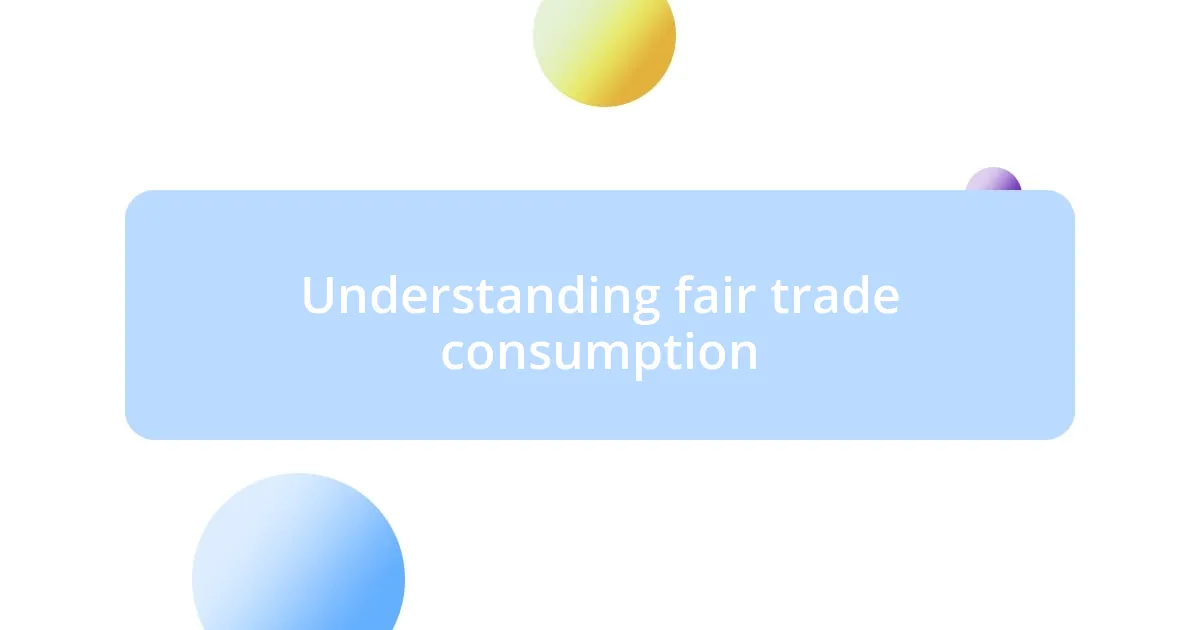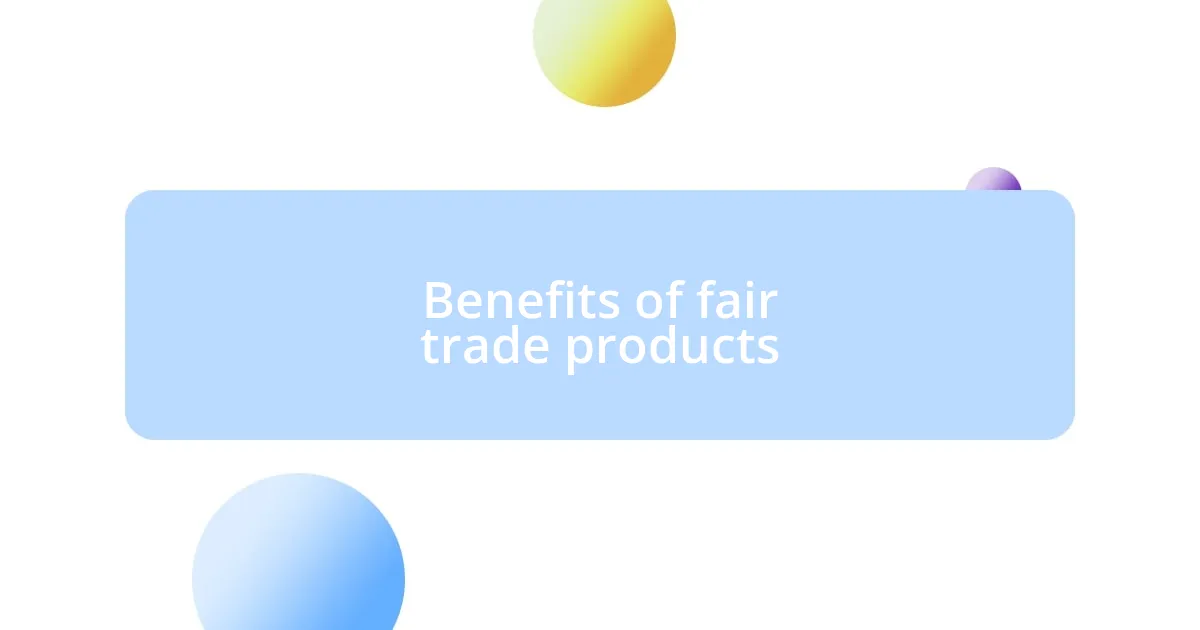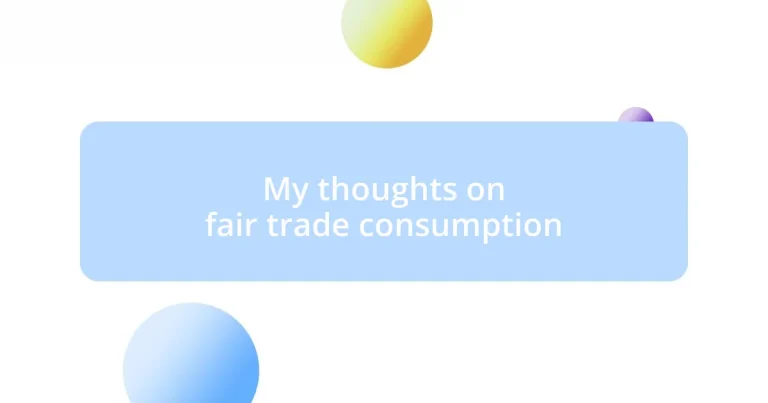Key takeaways:
- Fair trade consumption promotes ethical practices, empowering farmers and workers in developing countries while fostering community development.
- Challenges include consumer lack of awareness, misuse of fair trade certifications, and higher prices that deter ethical purchasing.
- Personal choices in fair trade reflect individual values and contribute to building a more equitable global economy.
- Engaging with fair trade products transforms consumer experiences, turning purchases into acts of solidarity and support for sustainable practices.

Understanding fair trade consumption
Fair trade consumption is more than just a purchasing decision; it’s a commitment to ethical practices and social justice. When I first learned about fair trade, I was intrigued by how it seeks to empower farmers and workers in developing countries. I remember feeling a mix of hope and responsibility as I realized that my choices could have a positive impact on someone else’s life.
Understanding fair trade means recognizing that each product carries a story of the people behind it. Imagine sipping your morning coffee, knowing that the farmer who grew the beans received a fair wage and worked under safe conditions. Doesn’t that make the experience richer? By opting for fair trade products, I often think about the choices I make—how they reflect my values and support a more equitable global economy.
It’s crucial to appreciate that fair trade isn’t just about premium prices; it’s about fairness, sustainability, and community development. I once visited a local store that exclusively sold fair trade items, and it was enlightening to talk with the owners about the direct trade relationships they had built over the years. How often do we consider the stories behind what we buy? By diving deeper into fair trade consumption, we foster a greater understanding of the interconnectedness of our global community.

Benefits of fair trade products
When I started exploring fair trade products, I was amazed at the difference they can make in the lives of producers. Every cup of coffee or bar of chocolate I enjoy carries the weight of fairness, ensuring that the farmers receive a living wage and work in safe environments. This connection makes each purchase feel like a small step towards a more just world.
- Supports small-scale farmers and artisans.
- Promotes sustainable farming practices and ethical production.
- Strengthens communities through reinvestment in local resources.
- Ensures fair wages and safe working conditions.
- Encourages consumers to make informed and ethical choices.
I recall a memorable experience at a local fair trade market; I met an artisan who poured his heart into each handmade item. Listening to his stories about how fair trade improved his life and community was incredibly touching. It wasn’t just about buying a product; it was about supporting a dream, fostering a sense of solidarity with people across the globe. This is the real beauty of fair trade—it enriches not only our lives but also the lives of those who create the products we cherish.

Challenges with fair trade practices
Fair trade practices face several challenges that can hinder their effectiveness. One significant issue is the lack of awareness among consumers. Many shoppers, including myself at times, overlook fair trade options or simply don’t understand what the label truly represents. This can lead to missed opportunities to support ethical practices in the marketplace.
Another considerable hurdle is the potential for fair trade certification to be misused. There are instances where brands label their products as fair trade without fully adhering to the guidelines. This phenomenon, sometimes referred to as “greenwashing,” can be quite frustrating. I remember discovering a product that claimed to be fair trade, only to find out later that the supplier wasn’t fully compliant with fair trade standards. It made me question what I was really supporting with my choices.
Finally, I’ve found that pricing can be a barrier to fair trade consumption. While these products are often more expensive due to higher production costs, they’re still perceived as unaffordable by many consumers. I reflected on my own budget constraints when shopping, which sometimes led me to opt for regular products instead of fair trade ones. It’s a complex situation that challenges the intention behind our choices, don’t you think?
| Challenges | Insights |
|---|---|
| Lack of Consumer Awareness | Many consumers, including myself, are unaware of fair trade options and their significance. |
| Misuse of Certification | Brands may claim fair trade status without proper adherence, leading to mistrust. |
| Pricing Barriers | Higher costs of fair trade goods can deter consumers from making ethical choices. |

Personal reflections on fair trade
When I first made the conscious decision to buy fair trade, it felt like a small act of rebellion against the conventional consumerism I had known. I remember standing in the grocery aisle, contemplating which chocolate bar to choose. I often think, how could a simple choice yield such significant impact? Opting for fair trade wasn’t just about satisfying my sweet tooth; it was my way of standing in solidarity with farmers striving for better lives.
Each time I indulge in fair trade coffee, I can’t help but recall the stories shared by baristas at local cafés. They often emphasize how each cup supports farmers who invest in their communities. It makes me ponder—am I merely drinking coffee, or am I actually participating in a larger narrative of hope and resilience? This awareness transforms my coffee breaks into moments of reflection, inviting me to savor each sip.
Sometimes, I do wrestle with the emotional weight of my purchasing decisions. I’ve hesitated when faced with the higher prices of fair trade items, wondering if my budget could stretch to accommodate them. This inner dilemma leads me to ask: is it worth it to invest more when each dollar contributes to fair systems? In these moments, I remind myself that even small choices can empower entire communities, making the decision feel justifiable and, ultimately, fulfilling.














